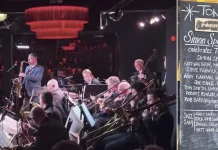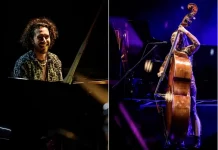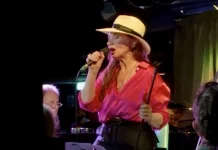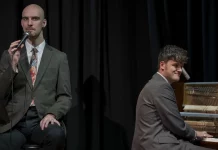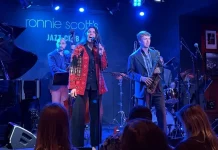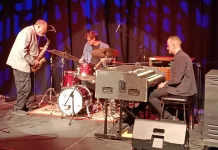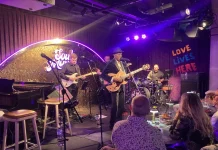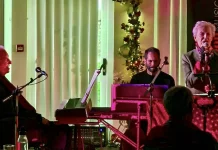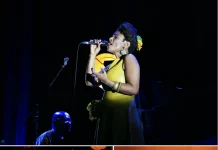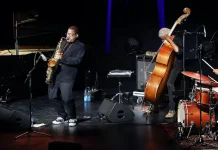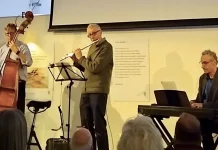I booked tickets for this gig in January, so to say I was looking forward to this two-set performance from Surman, Rob Luft, Rob Waring and Thomas Strønen would be something of an understatement. I think it was my JJ colleague Simon Adams who once remarked that, no matter what instrument he played, the sound of Surman brought him to his knees. Here I’m very much with Simon, having loved virtually everything the great man has recorded, from the late 1960s onwards.
The largest portion of that work has been cut for ECM and this Ronnie Scott’s gig featured music from Words Unspoken, Surman’s latest – and excellent – release for the label and his second ECM album in the company of the classically trained, American but Norway-domiciled Waring, who appeared with Brazilian pianist Nelson Ayres on Surman’s 2018 trio release Invisible Threads.
The full house gave the warmest introductory reception to Surman – who at just a couple of months or so short of his 80th birthday looked in great shape. “I first played here in 1968”, he remarked, “but that’s all I can remember about that! It was a long time ago, after all … Apart from the different location of the bar, I do remember that! Anyway, let’s get on with the music, some ‘words unspoken’ shared between us on stage, which we hope you’ll enjoy.”
Unfolding, spacious ostinato figures on bass clarinet led to a plaintive and piping mix of soprano reflection and declamation from Surman, his characteristic combination of legato and staccato accents underpinned by adroitly pitched colouristic interaction from guitarist Luft and vibist Waring (the latter sometimes gently drawing a bow across the ends of his instrument’s keys). The ultra-alert Norwegian Strønen – a most subtle, listening drummer, with a crisply intelligent approach to matters of both silence and cross-rhythmic dynamics and texture – offered many a captivating moment.
While Surman’s chops were in top shape, and the all-original music compelling throughout – sample Graviola from the album – at times, unfortunately, the overall sound mix was too high, even rock-like, and capable of turning subtle overtones into an undifferentiated blur. At one point Surman had to ask the in-house sound man to take some of the saxophone sound out of his monitor, as he was experiencing feedback.
Fortunately, this aspect of the performance improved 100% in the second set. Speaking to Rob Luft in the interval, he assured me that “things will be very different in the second set”. And so it proved. Luft – whose latest work can be enjoyed on the recent April Records release As Time Passes, with Arild Andersen (bass) and Daniel Sommer (drums) – often plays a Gibson ES-175, a model associated with, e.g., Herb Ellis, Jim Hall and Pat Metheny. Here he stepped out with a Gibson L-5, a model associated especially with Wes Montgomery. The result was music of classic modernist linear and chordal quality, blended with both chiming impressionist nuance and expressionist colour. Luft’s playing also held no little visual impact, as he bent deeply over his instrument or interacted nimbly with his electronic equipment, including foot pedals, at times a touch in the manner of a contemporary dancer.
With sound levels restored to the level appropriate for the intimate ambience of what remains one of the most esteemed jazz clubs in the world, the music of Words Unspoken could be enjoyed in all its limpid clarity of focused yet finely spread sound and detailed interplay of evolving motif and improvised measure. The delightful, lightly dancing Onich Ceilidh was but one gem in a set full of archetypal Surman magic, never more so than in the concluding, full-on rendering of Pebble Dance, the folkish opening track of Words Unspoken which at times here attained a practically shamanic quality of Coltrane-like rhythmic, tonal and melodic potency.
The ecstatic audience bayed as one, many on their feet. “Now that feels like 1968!” said a laughing Surman, before his superbly attuned quartet brought the tempo and temperature down with the laid-back, sliding, slo-mo and suspended grooves of the encore that was Belay That. More baying followed: “You don’t have to go home yet – but you’ve got to get out of here right now, as Ronnie used to say!” responded the ever genial Surman, readying himself to fly to Turkey the following day for the next concert.
John Surman Quartet at Ronnie Scott’s, London, 10 June 2024. Surman (soprano saxophone, bass clarinet, penny-whistle, electronics); Rob Luft (guitar); Rob Waring (vibes); Thomas Strønen (drums)


